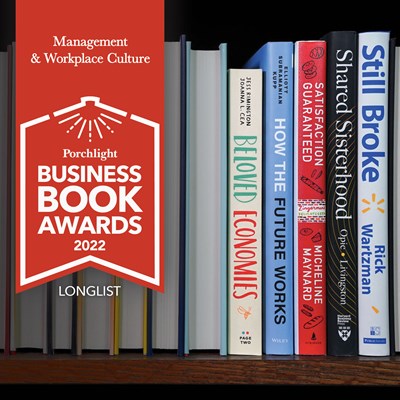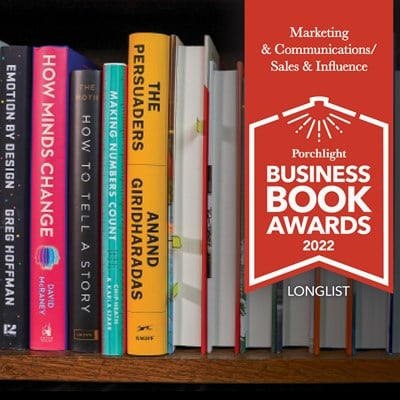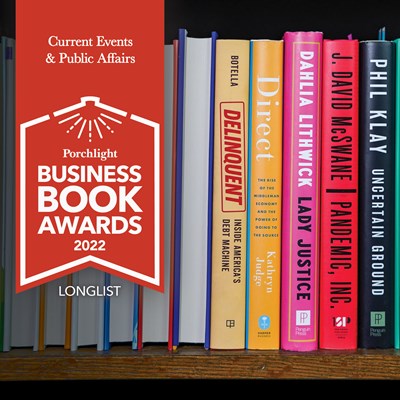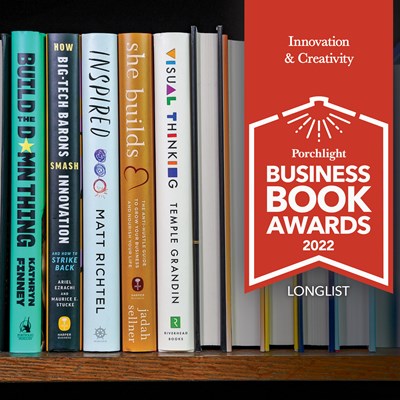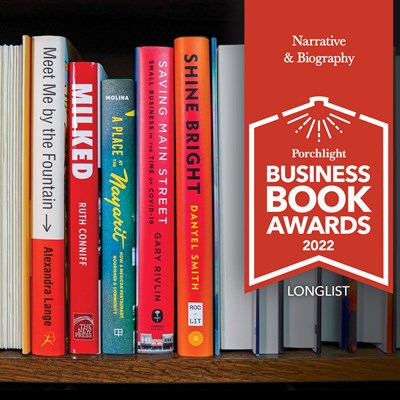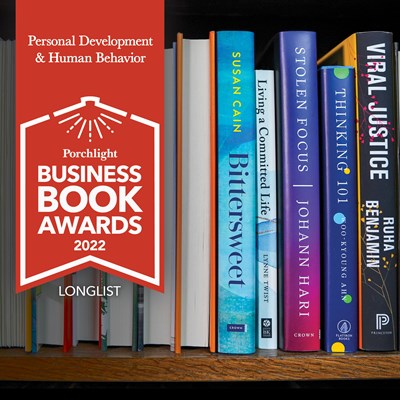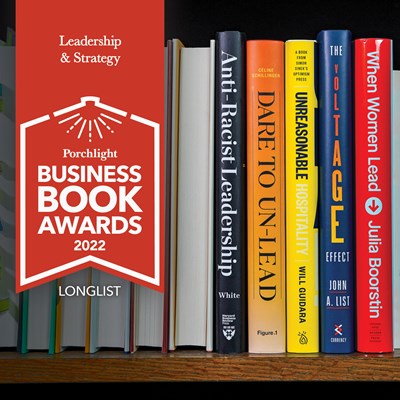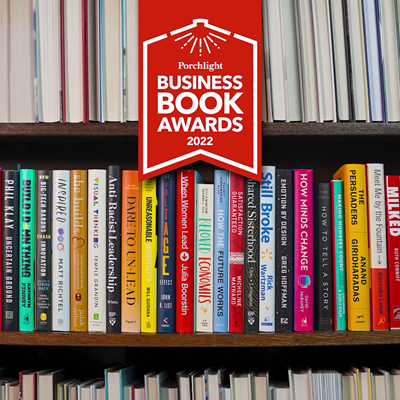Inside the 2022 Longlist | Big Ideas & New Perspectives
December 14, 2022
When we take a look beyond our own front doors to learn from the world around us, we might find that the ideas that feel like mere pipe dreams now can—and in some places, already have—become our reality.
If I had to distill the theme that ties all the books in the Big Ideas & New Perspectives category together into just one sentence, it would be, “What do we value?”
This is a question that I’ve been thinking about since the early shelter-at-home days of the COVID-19 pandemic. At a time when the fragility of existence has been laid so painfully bare, it’s hard not to take stock of one’s life—from our careers, to our hobbies, to the way we treat the people around us—and wonder, what is any of this for? Does doing things the way they’ve always been done still make sense? And, if not, where do we go from here?
What each book in this category does is shine a light on the systems that surround us, question them, and offer visions of alternate realities that are much closer than we think. When we understand the inner workings of industries like higher education and youth sports, we can make more informed, intentional choices for ourselves and for our children. When we treat the people around us not like numbers on a spreadsheet but like the multidimensional beings they are, we can rebuild the connections that make us a flourishing community. And when we take a look beyond our own front doors to learn from the world around us, we might find that the ideas that feel like mere pipe dreams now can—and in some places, already have—become our reality.
Each book in this category calls upon the reader to reevaluate the core values that drive them and to make decisions based off those values rather than entrenched societal norms. What truly drives these arguments home is the fact that every author in this category is someone who would normally benefit from defending the status quo. Instead, we have two university presidents analyzing the human and financial costs of higher education; a game designer calling out an excessive culture of gamification; a former running coach questioning the current state of youth sports; and a nation’s First Lady willing to elevate her people’s stories without added political spin.
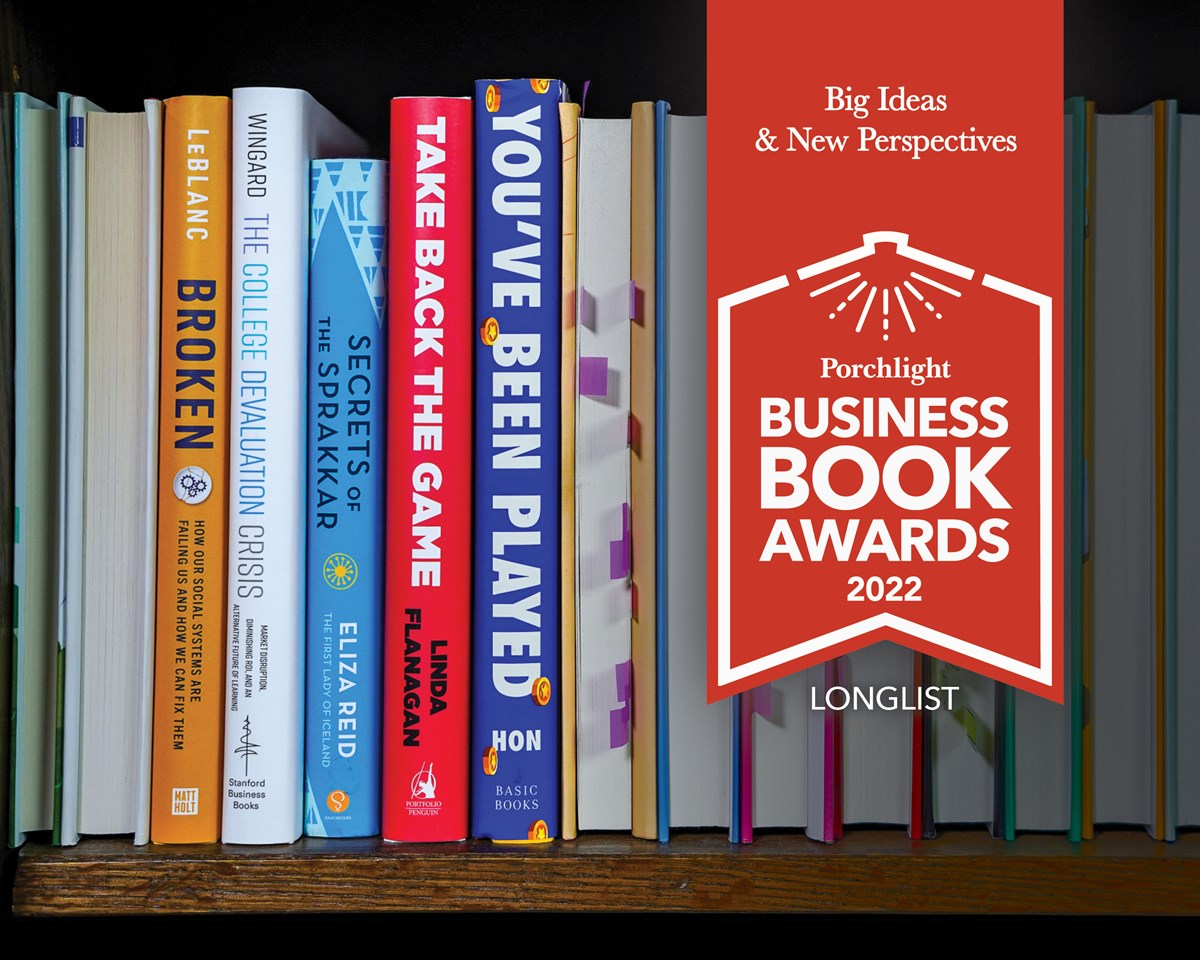
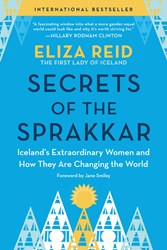 Secrets of the Sprakkar: Iceland’s Extraordinary Women and How They Are Changing the World by Eliza Reid, Sourcebooks
Secrets of the Sprakkar: Iceland’s Extraordinary Women and How They Are Changing the World by Eliza Reid, Sourcebooks
Like the proverbial frog in the pot of boiling water, I’ve found myself trading outrage for dejected acceptance of all the ways gender and racial inequity manifests in my day-to-day life. In the United States, I’m part of a demographic that gets paid an average of 57 cents to the white man’s dollar for the same job and qualifications; whose fully protected right to marriage was only recently codified into federal law; and whose access to basic reproductive healthcare vanished overnight, among other things. From vantage points like these, it’s difficult to believe that society can move towards a more equitable future where race and gender are no longer liabilities.
And yet, Secrets of the Sprakkar doesn’t just believe in this future—it offers living proof from a country where that future is already happening. As a journalist by trade, a Canadian immigrant, and the current First Lady of Iceland, Eliza Reid elevates the stories of Icelandic women and nonbinary individuals to demonstrate what a society built on gender equity looks like.
Icelanders grow up with the stories of sprakkar—“outstanding women” that are sometimes mythical but most often historical—and so the notion of gender equity directly affects the laws that serve as the foundation for an equitable society. The Icelandic government guarantees parents twelve months of paid leave (five for each parent, plus two to be divided up between them as desired) and ample access to midwife-led care, which studies largely show produces better birth outcomes than physician-led care. The Icelandic parliament passed legislation in 2013 requiring a 60/40 gender ratio on the boards of companies with fifty or more employees. Same-sex marriage was legalized in 2010 with a unanimous legislative vote. All of these laws are reflections of what Icelandic society values: “As a society,” Reid writes, “we have passed the tipping point of whether gender equality is important or valuable and have progressed to debate how to achieve it.”
Though it might be expected that Reid would spin an image of Iceland as a perfect utopia, she balances her praise with a critical look into the sociopolitical areas where Iceland could still improve, recognizing that the creation of a more equitable society isn’t simply a cultural inheritance, but the product of intention and ongoing hard work.
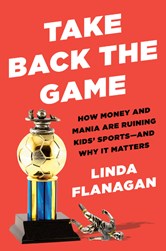 Take Back the Game: How Money and Mania are Ruining Kids’ Sports—And Why it Matters by Linda Flanagan, Portfolio
Take Back the Game: How Money and Mania are Ruining Kids’ Sports—And Why it Matters by Linda Flanagan, Portfolio
What do we value when it comes to youth sports? Do we sign our kids up because we want them to get exercise and make friends? Or are we hoping to raise star athletes that will bring home all the awards, get full-ride scholarships to elite universities, and make us the envy of our peers? It’s hard to imagine any parent willingly admitting to the latter, and yet, it's become an undeniable factor in the explosion of the youth sports industry.
Journalist Linda Flanagan, a former cross-country and track coach, dives into the ways that youth sports have been transformed from an everyday pastime into a multi-billion-dollar industry that encourages adults to place their societal burdens on the literal shoulders of their children.
As the economy continues to weigh on us—from wage stagnation to inflation to the exorbitant cost of higher education—Flanagan argues that youth sports have increasingly been regarded as a necessary investment to further a child’s prospects and help them (and, by extension, their families) stand out in the world. And yet, chasing after these benefits comes with undue costs—from the monetary costs of buying state-of-the-art equipment and paying travel league dues, to the physical toll of overwork on still-developing bodies, to the mental burnout suffered by athletes and their families—that only benefit the companies and institutions looking to profit from the endeavor.
The COVID-19 pandemic blurred the lines between our work and family lives, and this book demonstrates what happens when we let our adult stressors bleed unchecked into the simpler lives of our children. It’s also a call to action for readers to pause and take stock of whether we are truly being motivated by our values or by what society wants us to believe is important, and to determine for ourselves what—and who—really matters in the grand scheme of things.
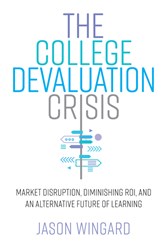 The College Devaluation Crisis: Market Disruption, Diminishing ROI, and an Alternative Future of Learning by Jason Wingard, Stanford Business Books
The College Devaluation Crisis: Market Disruption, Diminishing ROI, and an Alternative Future of Learning by Jason Wingard, Stanford Business Books
When I decided to go for my master’s degree, I placed a lot of value on the prestige of advanced education—the U.S. Census Bureau estimates that only about 4.6% of Latinas in the United States hold a master’s, and I was genuinely thrilled by the challenge of graduate school. I'll never regret my scholarly achievement, but I do find myself often wishing that I had placed greater value on improving my career prospects by any means possible, including alternative education models that would have saddled me—and millions like me—with far less student loan debt.
This is what Temple University president Jason Wingard explores in The College Devaluation Crisis. Because of his role as a university president, one might expect that Wingard would attempt to rehabilitate the image of the college degree and exhort employers to once again find value in it. He demonstrates that the promise of the college degree hasn’t been entirely unfounded—it did historically have significant and immediate impact on graduates’ job prospects and wealth. But today, four-year universities continue to rely on curricula meant to produce generalized critical thinkers, whereas employers increasingly want people with concrete, specialized skills and tangible proof of their ability to do the job well. As such, Wingard calls upon the industry of higher education to better understand the needs of its students and to prioritize not just the mere prestige of a college degree, but the equipping of students with the tools to find gainful employment upon graduation.
Wingard then presents case studies highlighting alternative educational models beyond the traditional four-year college degree—from intensive bootcamps to employer-sponsored continuing education to self-paced online degree programs—that have sprung up to bridge the labor gap, often producing better results for both employers and future employees in a shorter timeframe and at a fraction of the cost of a traditional degree. The data speaks for itself: there is no one-size-fits-all solution, and when individuals have the option to follow the paths that truly align with their values, they can find greater fulfillment and prosperity as a result.
 You’ve Been Played: How Corporations, Governments, and Schools Use Games to Control Us All by Adrian Hon, Basic Books
You’ve Been Played: How Corporations, Governments, and Schools Use Games to Control Us All by Adrian Hon, Basic Books
A few years ago, I signed up for classes at a trendy (and pricey) nationwide fitness studio where participants used heart rate monitors to earn “points” based on heart rate levels throughout the hour—higher heart rate numbers meant more points, and more points equaled a more successful workout. I'd rather pick up a video game controller over a jump rope any day, so the combination of exercise with a gaming mechanic I understood inspired me to push myself to earn as many points as I could, which then led me to attend classes three to four times a week to chase that winner’s high. What I didn’t realize was that, as my cardiovascular system got stronger, it would become increasingly harder to hit those high heart rate numbers and thus score my magical fitness points. So instead of feeling pride in my improving physical health, I would find myself at the end of my hour-long sessions drenched in sweat and nearly hyperventilating and wondering, as I looked at my final score flashing on the screen, why I was failing. And rather than explain basic exercise science to me, my trainers suggested I sign up for even more classes per week so I could hit my points goal. (This didn’t sit right with me or my wallet, so I quit.)
This kind of gamification seems to be everywhere—some willingly opted into, but a concerning amount of it imposed on us. Adrian Hon’s book, You’ve Been Played, dives into how gamification has taken hold not just in these overt instances, but in ways more subtle and insidious, and how it has warped our perceptions of what is truly valuable in our lives.
Hon notes that “gamified fitness products […] have a clear interest in keeping you engaged so you’ll buy another model in a few years’ time or keep your monthly subscription active.” Employers such as Amazon and Uber effectively keep wages low by tying monetary incentives to workplace quests, pushing workers to continue past their physical and mental limits in order to win their bonuses. Even the way we communicate has become gamified, as social media users tailor their posts to pull in the most likes and retweets. Most of the ventures aren’t trying to be outright evil and, in fact, are well-intentioned, but in the long run, end up causing more harm than good.
Being a game designer himself, Hon still believes that there can be ethical gamification. The broad solution, ultimately, is for consumers to reconnect to their intrinsic motivation—what actually matters to them—rather than be guided solely by the products and programs around them.
To tie this all together, then, is the final book in the category:
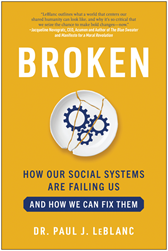 Broken: How Our Social Systems are Failing Us and How We Can Fix Them by Paul LeBlanc, Matt Holt
Broken: How Our Social Systems are Failing Us and How We Can Fix Them by Paul LeBlanc, Matt Holt
In the early pages of the book, Southern New Hampshire University president Paul LeBlanc writes:
In every conference room in every building at SNHU is a sign that reads, “Are the decisions we made here today good for students?” Not good for us. Not good for the system in which we work. But good for the human beings for whom we exist.
And perhaps this is a question that any gathering of people should have above their doors, literal and figurative. Take any of the books discussed above, and the question stands: are the decisions we made here today good for women? Children? Families? Workers? Anyone? Too often, we go through our days moving from task to task without pausing to consider the repercussions of our actions, quietly letting our moral center erode away.
Broken is an exploration of the systems that most need to have humanity at their core—higher education, healthcare, government, and the criminal justice system—and that, for too long, have forgotten all about it. “When systems fail the people they are meant to serve,” LeBlanc writes, “it’s almost always because of a failure of human values more than an inherent attribute of the system.”
LeBlanc tells the story of his mother-in-law, Rosella, who was being treated at Brigham and Women’s Hospital and whose condition was progressively worsening. Doctors offered thorough, data-filled status reports about her condition, all the while skirting the undeniable fact that it was “time to let Rosella go.” After consulting with the family, who no longer wished to see their loved one suffer, a senior nurse, Christine, takes it upon herself to disconnect Rosella from all the machinery, brush her hair, and give her family time to peacefully say their goodbyes. LeBlanc writes (emphasis mine):
“It took Christine, a frontline worker in touch daily with the actual person at the heart of this small drama, to remind everyone that Rosella mattered—not the tests, protocols, or procedures available to her doctors […] It took Christine to remind everyone that the person the system was serving mattered most, to see Rosella again, and to rehumanize its care of her.”
Across this year’s selection of books in the Big Ideas and New Perspectives category, the reality of systems turning on us is stark. And yet, nothing is beyond repair. Broken offers the idea that our intentional choices to do better by one another are all it takes to start turning these systems—and thus, our society—back to a more caring place.









